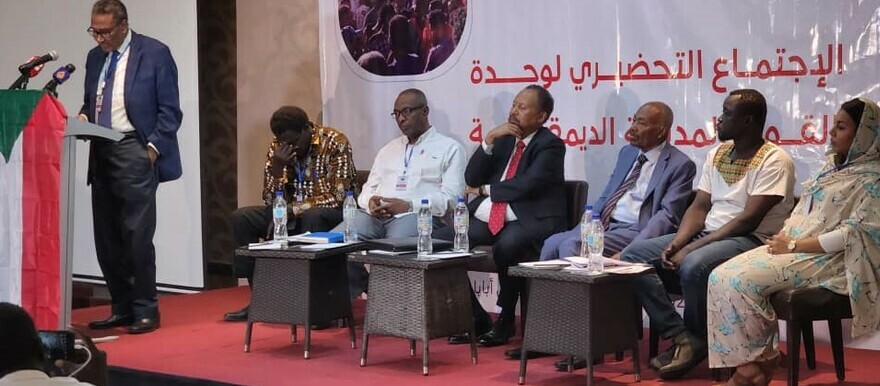The Sudanese anti-war civil forces concluded their meeting in Addis Ababa, Ethiopia, on Thursday and formed an organizational body that includes the Democratic Civilian Front to prepare for the founding meeting of the coordination.
Former Prime Minister Abdullah Hamdok will head the front, including representatives of political and civil forces, resistance committees, unions, and professional bodies, and a 30-member executive coordination office.
During their meetings on Monday, the group agreed on political, economic, humanitarian, and media papers paving the way to stop the ongoing war in the country.
In a press statement seen by Radio Tamazuj, former Prime Minister Hamdok called on the warring parties to facilitate procedures for aid workers and humanitarian aid access.
He also appealed to civil forces to unite their efforts to end the war, address the urgent humanitarian effects, and achieve comprehensive peace.
“The preparatory meeting was a first step and the beginning of a process that we hope will coordinate and unify the civil, democratic, anti-war position,” Hamdok said.
He reiterated his support for the meeting’s recommendations and final statement and firmed his readiness to chair its leadership body leading up to the founding conference.
The former prime minister thanked the neighboring countries and the regional and international community for their support and appealed to them to help stop the war and address the humanitarian crisis.
He also thanked Saudi Arabia, the US, the Intergovernmental Authority on Development (IGAD), and the African Union (AU) in their efforts to end the war.
Hamdok welcomed the launch of a new round of Jeddah talks under the auspice of Saudi Arabia and the United States.
In their final statement on Thursday, the civil forces said they held in-depth discussions and decided to organize specialized workshops that would recommend developing the civil negotiating position, security and military reform, transitional justice, and institutional rebuilding.
They would also establish a constitution, develop an economic program for reconstruction, and discuss issues of state and local government.
The meeting approved a paper called “General Guidelines for the Negotiating Process to Stop the War and Reestablish the Sudanese State” as a draft that expresses the point of view of the civil alliance.
It also includes foundations and principles for ending the war and establishing the Sudanese state.
The attendees stressed the importance of confronting the humanitarian catastrophe resulting from the war.
The meeting called for a ceasefire that would allow the opening of safe corridors for relief, international oversight, and the adoption of new methods for delivering aid.
The attendees called on the Sudanese armed forces and the Rapid Support Forces to facilitate the passage of relief aid.
The participants called on the parties rejecting the war to contribute to establishing a comprehensive civil front against the war and restore democracy.




